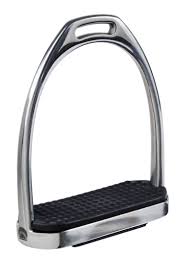
记忆方法
1. stair + rope => stirrup.
2. literally "climbing rope".
3. Originally a looped rope as a help for mounting.
2. literally "climbing rope".
3. Originally a looped rope as a help for mounting.
中文词源
stirrup 马镫
来 自 古 英 语 stigrap, 马 镫 , 来 自 Proto-Germanic*stigaz, 爬 , 来 自 PIE*steigh, 爬 , 词 源 同 stair,stile,+rap,绳子,来自 rope 古英语拼写形式。
英语词源
- stirrup
-
stirrup: [OE] A stirrup is etymologically a ‘climbing rope’. The word goes back to a prehistoric Germanic compound formed from the base *stig- ‘climb’ (source also of English stair and stile) and *raipaz (ancestor of English rope). The earliest stirrups were looped pieces of rope.
=> rope, stair, stile - stirrup (n.)
- Old English stigrap "a support for the foot of a person mounted on a horse," literally "climbing rope," from stige "a climbing, ascent" (from Proto-Germanic *stigaz "climbing;" see stair) + rap (see rope (n.)). Originally a looped rope as a help for mounting. Germanic cognates include Old Norse stigreip, Middle Dutch stegerep, Old High German stegareif, German stegreif. Surgical device used in childbirth, etc., so called from 1884. Stirrup-cup (1680s) was a cup of wine or other drink handed to a rider already on horseback and setting out on a journey, hence "a parting glass" (compare French le vin de l'etrier).
权威例句
- 1. She had to lengthen her stirrup leathers.
- 她得放长马镫皮带.
- 2. Jane put one foot in the near stirrup and turned to look at the stranger.
- 简一只脚就近蹬上马镫,转脸看着陌生人。
- 3. The stirrup leathers rubbed raw patches on his legs.
- 马蹬皮带把他腿上的皮肤擦伤引起疼痛.
- 4. He walked up to the horse and put his foot in the stirrup.
- 他走到马的身边,把脚踏在马蹬上.
- 5. If you speak the truth, have a foot in the stirrup.
- 讲真话的人应该一只脚踩在马镫里.